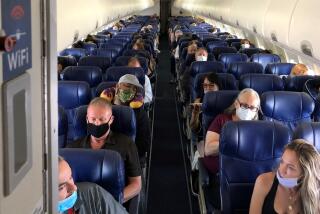Ex-Surgeon General Links Secondhand Smoke to Crew’s Cancer Cases
- Share via
MIAMI — Former Surgeon General Julius B. Richmond, testifying Wednesday in the lawsuit by flight attendants against the tobacco industry, said he believes airline crews were exposed to substantial concentrations of secondhand smoke, resulting in some cases of cancer and other diseases.
“Breathing secondhand smoke in enclosed places, and particularly places such as airline cabins,” creates “very considerable” risks of lung cancer, heart disease and respiratory illness, Richmond testified in Dade County Circuit Court.
Richmond, 80, surgeon general from 1977 to 1981 under President Jimmy Carter, was the lead-off witness in the landmark case--the first class action ever tried against the tobacco industry and the first case to test cigarette makers’ liability for ailments supposedly caused by secondhand smoke.
The lawsuit names 28 current and former flight attendants who have allegedly suffered ill health. However, plaintiffs’ attorneys claim that as many as 60,000 attendants suffered health damage and should be compensated for their chronic exposure to cigarette smoke before airline smoking was banned seven years ago.
Richmond, a pediatrician who also served as first director of the federal Head Start program and is now a professor emeritus at Harvard Medical School, said his conclusions were based on “scientific evidence and what we know of the composition of tobacco smoke.”
Under questioning from plaintiffs’ lawyer Stanley M. Rosenblatt, Richmond said the dangers of secondhand smoke were well-established by 1986, when influential reports affirming the hazards were issued by the National Research Council and the surgeon general’s office. Seven years later, the Environmental Protection Agency declared secondhand smoke a “Class A carcinogen” responsible for an estimated 3,000 lung cancer deaths a year.
Tobacco lawyers have maintained that the evidence is inconclusive and that flight attendants could not have inhaled enough smoke in airline cabins to become ill.
In his cross-examination of Richmond, Walter Cofer, an attorney for cigarette makers Philip Morris Cos. and Lorillard Inc., sought to show that the effects of secondhand smoke are still a matter for debate.
He questioned Richmond about a 1994 report by the Congressional Research Service that concluded that available evidence did not prove secondhand smoke poses a significant risk. Richmond responded that that opinion was wrong.
He also described industry efforts to debunk the surgeon general’s report he issued in 1979, for the 15th anniversary of the original 1964 report linking smoking and lung cancer.
The 1979 report reviewed thousands of pages of studies published since the original document and found them “overwhelming in terms of the impact of cigarette smoking on health,” Richmond recalled. He said the evidence justified a preface to the report in which Joseph Califano, then secretary of Health and Human Services, described smoking as “slow-motion suicide.”
Richmond said that the day before the report was issued, the industry blasted it without having seen it. “It was one of the most amazing things I’d ever encountered in my professional career,” he testified.
“I was deeply offended on an ethical basis that the day before the public release . . . they called a press conference to refute the report,” he said.
Rosenblatt then asked Richmond if the industry’s conduct squared with its promise in a nationwide advertising campaign in 1953 to “cooperate closely with those whose task it is to safeguard the public health.”
On the contrary, Richmond said, there was no cooperation, and “I was acutely aware of the fact that [tobacco executives] were trying to create confusion as to whether there was any relationship between the use of tobacco products and disease.”
Richmond will be followed to the stand today by Dr. Ronald Davis, former director of the Office on Smoking and Health.
At the conclusion of Richmond’s testimony Wednesday afternoon, plaintiffs’ lawyers read to the jury excerpts from the 1994 deposition of Thomas E. Sandefur Jr., the former chief executive of Brown & Williamson Tobacco Corp., who died last year.
Under questioning from Rosenblatt, Sandefur testified that he does not believe it “has been proven that [smoking] causes lung cancer,” but said it was one of several risk factors, including fatty foods.
“Cheesecake?” Rosenblatt asked him. “Bacon, lettuce and tomato?”
“Yes . . . any fatty foods,” Sandefur responded.
Asked if secondhand smoke was a risk factor, Sandefur replied, “It may be, but it hasn’t been demonstrated to me yet.”
More to Read
Inside the business of entertainment
The Wide Shot brings you news, analysis and insights on everything from streaming wars to production — and what it all means for the future.
You may occasionally receive promotional content from the Los Angeles Times.










